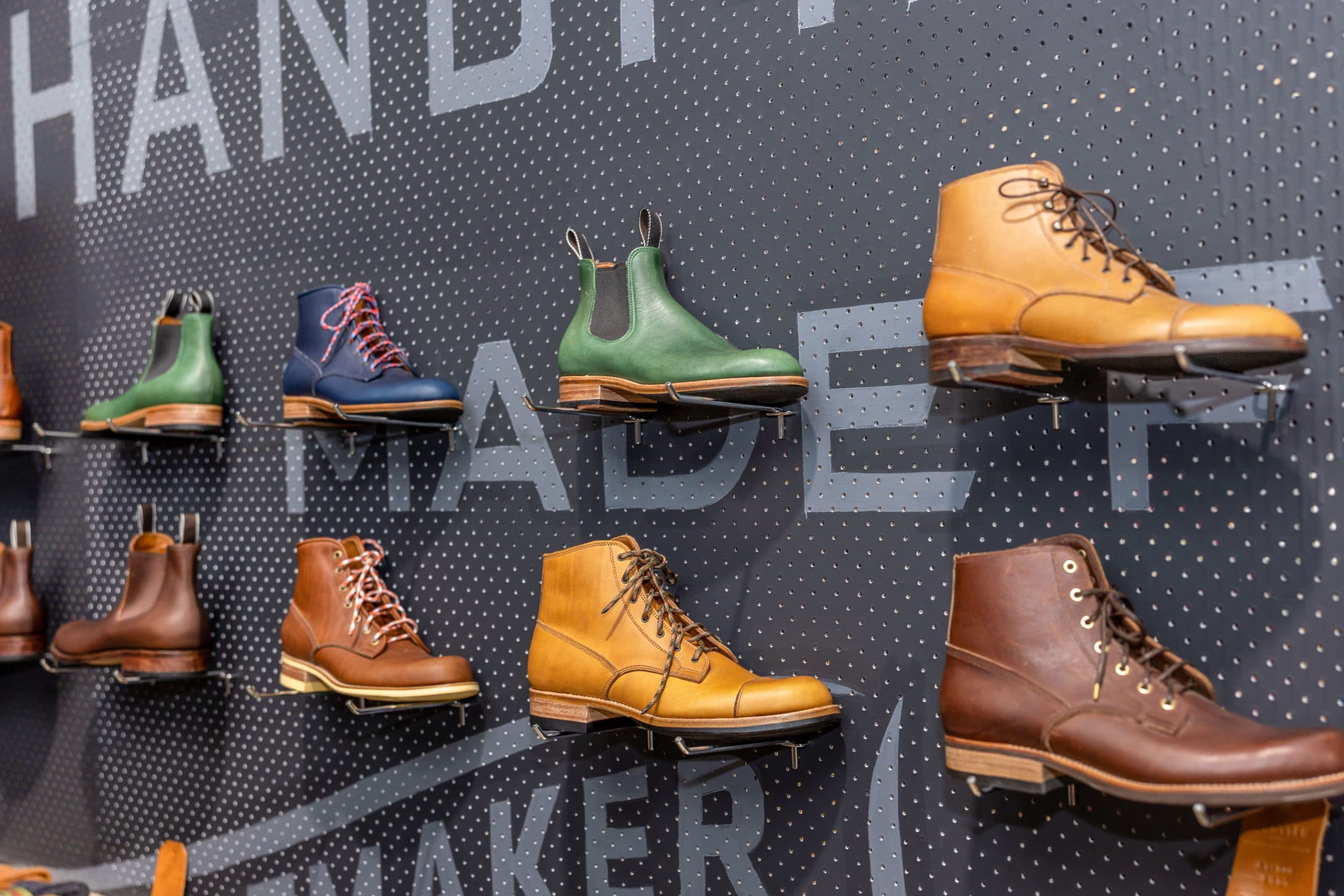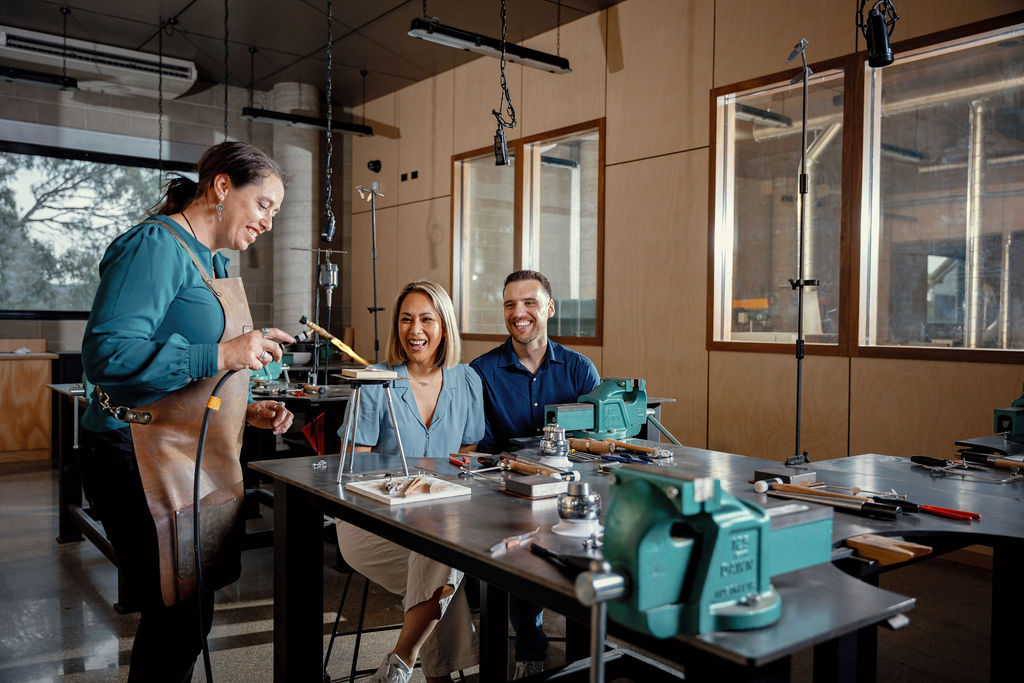As a young boy, Jess Cameron-Wootten remembers sitting in the corner of his father’s tiny studio, marvelling at the care Ross Wootten took as he crafted bespoke shoes from scratch.
Ross learnt the tricks of the trade from internationally-renowned Bulgarian shoemaker George Koleff in South Australia in the early 1970s.
Having since followed in his father's footsteps, Jess is now the head cordwainer at Wootten – a bespoke footwear and leather goods brand with a shop/workshop in Ballarat.
We recently spoke to Jess and his partner Krystina Menegazzo about the Wootten story and their new look Ballarat space, which is located in a former WWII gun cotton factory....
Firstly, what exactly is a cordwainer and leather craftsman?
"A cordwainer is the old English term for a shoemaker and is distinct from a cobbler, who fixes shoes, whereas a cordwainer makes them.
There are a handful of individual shoemakers operating in Australia out of their studios, specialising in their own ranges or styles, and there aren’t many factories (employing larger groups of people) left in operation in Australia."

Take us through the story behind Wootten...
"Not much more than 40 years ago, Australia’s footwear manufacturing industry was thriving.
But tariff cuts introduced during the 1980s radically changed the shoemaking landscape and brought an end to a proud era.
Over the next couple of decades, the industry began to die and mass-produced, foreign-made shoes quickly started to dominate the Australian market.
A few Australian shoemakers continued on though. One of those was Peter Cordwell, who had been making shoes for several years before the tariff changes came into force.
The Melbourne company he was working for was forced to close but despite the obvious signs to the contrary, Peter felt there was still a demand for high quality Australian-made shoes.
He founded Custom Fit Australia with Max Pizzey in 1991.
Eager to continue the legacy left by his father, Jess went to Custom Fit in 2008 with a background in design and leatherwork, and a keen sense that the wave of slow fashion was bringing with it a burgeoning desire for individual style (as well as practical comfort and dependable quality).
Peter, who had been contemplating retirement, was only too pleased to become a mentor to Jess with a view to ultimately handing the reins of the business over.
Custom Fit became Wootten in 2012, with Jess taking over as head cordwainer."
And why did Wootten make the move to Ballarat?
"Towards the end of 2017, we were notified that they were knocking our old Melbourne workshop down and turning it into apartments.
Thus we spread our search a little further and closer to home, and came across the beautiful Gun Cotton Warehouses in Delacombe (a suburb of Ballarat), which was the perfect fit for our workshop space.
The warehouses were built during World War II when American and Australian soldiers were stationed here on R&R.
They were built out of triple brick and steel frames to withstand the production of gun cotton.
After WWII, gun cotton was no longer necessary and so the buildings became the Ballarat Paper Mill in 1946.
We loved that the building was a blank canvas and we could put our spin on it.
We also loved that there was a collection of other businesses and creatives interested in doing good things and making the area more vibrant."

What are some of the changes you've made to your Ballarat workshop?
"We handmake all our leather goods and footwear from scratch at our Ballarat workshop.
We’ve expanded our retail front by having it pass through to the back of the workshop, allowing us more space to display our boots and the other goods we are showcasing.
It creates more of a feel of being ‘in’ the workshop than previously, when you could just see things through the workshop window.
The vibe between the front of the shop to the back of the new space is vastly different.
The back – which links to the workshop – has a more industrial vibe, suited to the workshop machinery and gun cotton warehouse aesthetic.
The front of the shop is clean and crisp and highlights some of the more delicate goods from other makers as well really nicely.
We are stocking locally-made socks by Humphrey Law, t-shirts made in Melbourne, pottery by Bridget Bodenham, knitwear and Ballarat banners by Pene Durston in Melbourne, illustration prints by Travis Price (Ballarat), locally-made hats by Carlisle Hats, and other hats by our friends Hills Hats in New Zealand.
Soon we will also be stocking jumpers and beanies made in Ballarat, plus an exciting and colourful range of handmade shoelaces made by us."
Is it an interactive experience for visitors?
"You might be able to see some boots being finished on the finishing table or hear/see the sole stitching machines going if that’s what we’re doing on the day.
Every day is different at the workshop, as we move from one stage of shoe production into accessories, depending on workflow and demand.
It’s a working workshop, so you’ll hear the sounds of production typically, as long as we’re not too busy in the shop so we all stop what we’re doing!"

And finally, what do you love most about Ballarat?
"We love the capability of the businesses in the area and the feeling of wanting to do the best and help each other out.
And we like that there is still industry here."
Wootten's workshop is located in Shed 1, 20 Elizabeth Street, Delacombe




